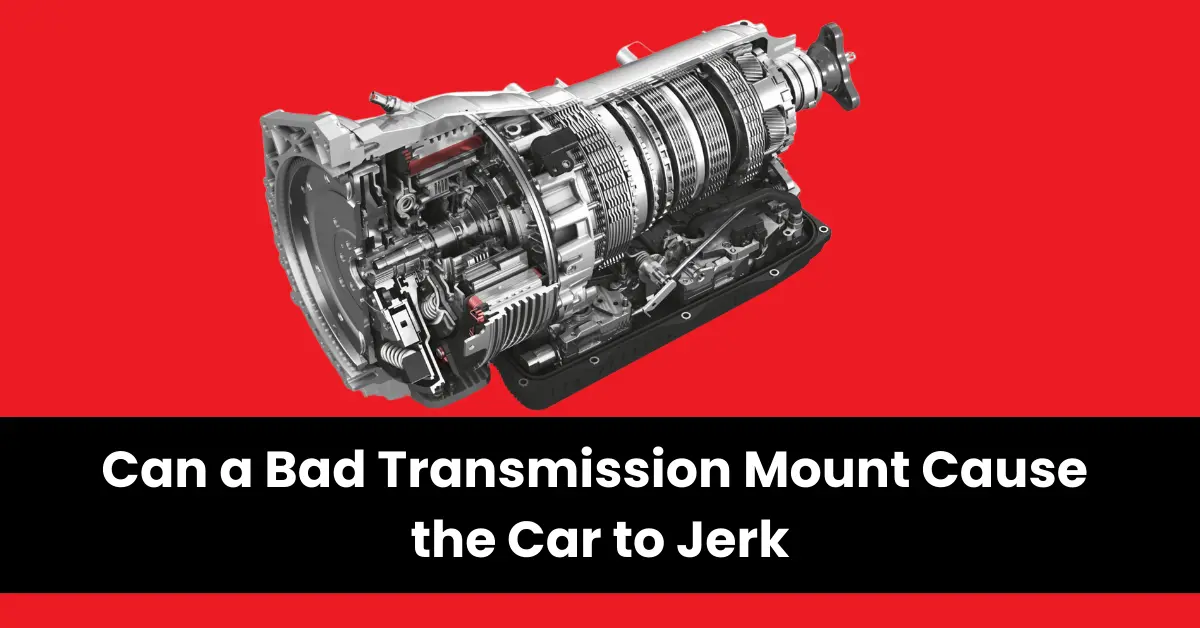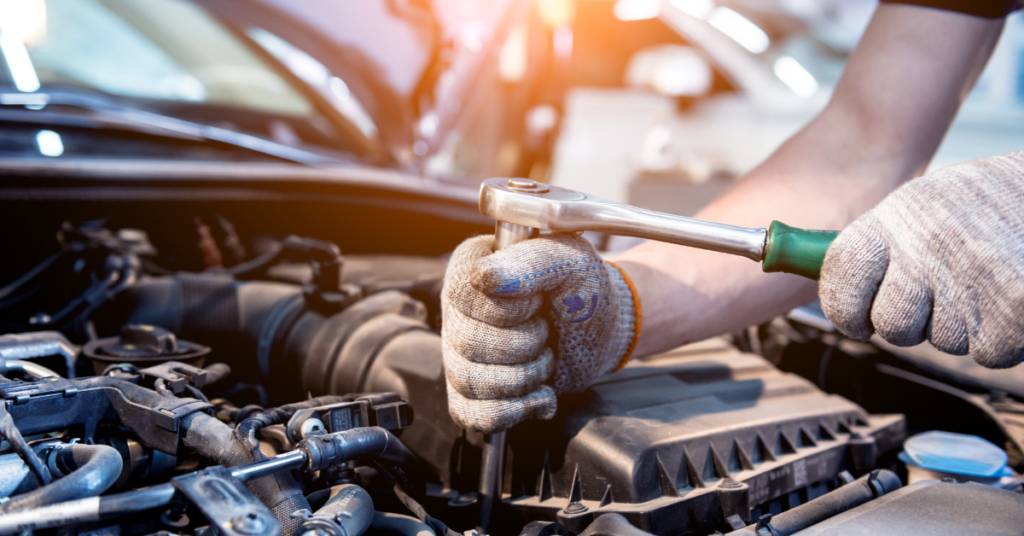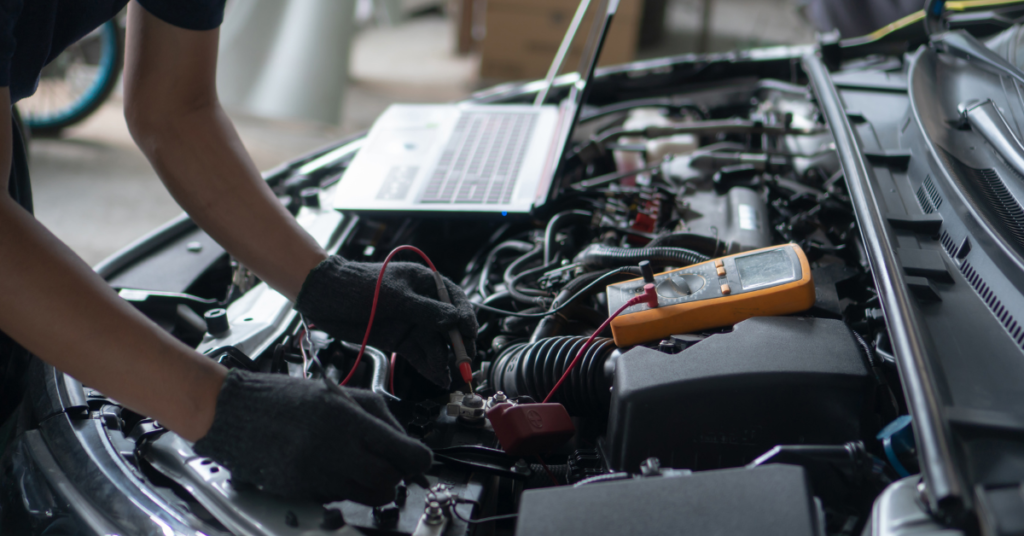
The transmission mount is an essential component of a vehicle’s drivetrain system. It plays a crucial role in ensuring smooth and efficient power transfer between the engine and the wheels.
However, a bad transmission mount can have adverse effects on the overall performance of your car, potentially causing it to jerk.
In this article, we will explore the reasons behind this issue, its symptoms, and the importance of timely replacement.
Contents
Understanding the Transmission Mount
Before delving into the impact of a bad transmission mount, let’s understand what it actually is. The transmission mount is a mounting bracket or support structure that holds the transmission system in place.
It is typically made of rubber or a combination of rubber and metal. This component is designed to dampen the vibrations and shocks generated by the engine and the drivetrain, preventing them from propagating throughout the vehicle’s chassis.
The transmission mount serves multiple purposes, including:
Vibration Dampening
As mentioned earlier, one of the primary functions of the transmission mount is to absorb and reduce the vibrations generated by the engine and transmission system.
This ensures a smoother and more comfortable driving experience. A bad transmission mount loses its ability to effectively absorb vibrations, causing the vibrations to be transmitted to the vehicle’s chassis.
This can result in a noticeable shaking and jerking sensation while driving.
Noise Reduction
By providing a cushioning effect, the transmission mount helps minimize the noise produced by the transmission system. This allows for a quieter and more enjoyable ride.
When the transmission mount is damaged or worn out, it may no longer effectively reduce the noise, leading to clunking or banging sounds, especially when shifting gears or driving over rough surfaces.
Maintaining Alignment
The transmission mount also plays a crucial role in maintaining the proper alignment between the engine, transmission, and drivetrain components. It prevents excessive movement or misalignment that could lead to damage or premature wear of various parts.
When the transmission mount is faulty, it may fail to hold the transmission system securely in place, resulting in misalignment. This can cause jerky movements when accelerating, decelerating, or changing gears.
Can a Bad Transmission Mount Cause the Car to Jerk
When a transmission mount starts to fail or becomes damaged, several negative consequences can occur, potentially causing your car to jerk.
Here are some of the possible impacts:
Increased Vibrations

A bad transmission mount loses its ability to effectively absorb vibrations. As a result, the vibrations generated by the engine and transmission can be transmitted to the vehicle’s chassis, causing it to shake and jerk.
This can make the driving experience uncomfortable and may even lead to driver fatigue over time.
Shifting Problems
A faulty transmission mount can affect the alignment and positioning of the transmission system. This misalignment may lead to difficulties in shifting gears smoothly, resulting in jerky movements and clunky gear changes.
It can also cause the gears to grind, potentially causing damage to the transmission itself.
Drivetrain Misalignment
As the transmission mount weakens or deteriorates, it may fail to hold the transmission system securely in place. This can cause misalignment issues, leading to excessive movement of the drivetrain components.
Such movement can introduce jerking motions when accelerating, decelerating, or changing gears. This can also place additional stress on other drivetrain components, potentially leading to further damage.
Excessive Engine Movement
A damaged transmission mount may allow the engine to move excessively during acceleration or deceleration. This uncontrolled movement can lead to abrupt shifts in weight distribution and cause the car to jerk.
It can also affect the stability of the vehicle, making it more difficult to control, especially during high-speed maneuvers.
Symptoms of a Bad Transmission Mount
Identifying a bad transmission mount is crucial for timely repairs and preventing further damage. Here are some common symptoms to watch out for:
Jerking and Vibrations

If you experience noticeable jerking or vibrations while driving, especially during gear changes or acceleration, it could be an indication of a bad transmission mount. The jerking sensation may be more pronounced when shifting gears or when the engine is under load.
Unusual Noises
A failing transmission mount may produce strange noises, such as clunking or banging sounds, especially when shifting gears or driving over rough surfaces.
These noises can indicate that the transmission mount is no longer effectively dampening the vibrations and shocks.
Visible Damage
Inspect the transmission mount visually. Look for any signs of wear, cracks, or damage to the rubber or metal components. Damage to the mount can compromise its effectiveness and lead to jerking or other issues.
Pay attention to any visible displacement or misalignment of the mount as well.
Engine Movement
Pay attention to any excessive movement of the engine while idling, accelerating, or decelerating. If the engine visibly shifts or moves more than usual, it may indicate a problem with the transmission mount.
This movement is often more noticeable when shifting gears or during sudden changes in speed.
Importance of Timely Replacement
Ignoring a bad transmission mount can result in more severe damage to your vehicle and compromise your safety on the road. It is crucial to address any transmission mount issues promptly. Here’s why:
Safety
A jerking car can be unpredictable and difficult to handle, especially at higher speeds. By replacing a bad transmission mount, you restore stability and improve the overall safety of your vehicle.
It ensures that the drivetrain components remain properly aligned, reducing the risk of sudden jerking movements that can lead to loss of control.
Preventing Further Damage
A malfunctioning transmission mount can place undue stress on other drivetrain components, leading to premature wear and potential failures.
By replacing it in a timely manner, you can prevent costly repairs down the line. It also helps preserve the integrity of the transmission system, preventing damage to gears, shafts, and other vital components.
Enhanced Driving Experience
A new, properly functioning transmission mount restores smoothness to your vehicle’s drivetrain. This improves gear shifting, reduces vibrations, and enhances your overall driving experience.
You’ll enjoy a quieter ride with improved comfort, especially during gear changes and acceleration.
In conclusion, a bad transmission mount can indeed cause your car to jerk. It affects the drivetrain’s alignment, increases vibrations, and leads to issues with gear shifting.
Recognizing the symptoms and addressing the problem promptly by replacing the faulty mount can help restore a smooth and safe driving experience.
Regular maintenance and inspections are crucial to ensure the optimal performance and longevity of your vehicle’s transmission mount.
FAQ
1. Can a bad transmission mount cause the car to jerk?
Yes, a bad transmission mount can cause the car to jerk. It can lead to misalignment of the transmission system, resulting in jerky movements when accelerating, decelerating, or changing gears.
2. What are the symptoms of a bad transmission mount?
Some common symptoms of a bad transmission mount include jerking and vibrations during gear changes or acceleration, unusual noises like clunking or banging sounds, visible damage to the mount, and excessive movement of the engine while idling or shifting gears.
3. What are the impacts of a bad transmission mount?
A bad transmission mount can result in increased vibrations, shifting problems, drivetrain misalignment, and excessive engine movement.
These issues can make the driving experience uncomfortable and potentially cause damage to the transmission and other drivetrain components.
4. Why is timely replacement of a bad transmission mount important?
Timely replacement of a bad transmission mount is important for safety, preventing further damage to other drivetrain components, and enhancing the overall driving experience. It restores stability, reduces the risk of loss of control, prevents premature wear, and improves gear shifting and comfort during driving.



